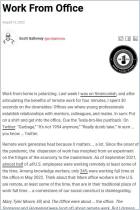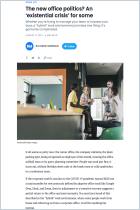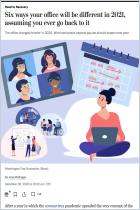
Will workers continue to pay a price for flexibility?
Employees with non-traditional working arrangements have been punished in pay and promotions alike. As flexible work becomes the norm, can we end the penalty?
Recommendation
Writing for BBC, Katie Bishop offers a timely assessment of the future and sustainability of remote and hybrid work. She raises essential questions about contemporary work and considers various scenarios about the future of remote, hybrid and in-office workers. She asks if employers will remain open to virtual staff members and if corporations will give advancement preference to in-office employees or equally value remote workers? Bishop focuses more on analyzing the present situation than on making predictions about future workplaces or the relationships among traditional, remote and hybrid workers, but her caution to remote workers about their career path rings loud and clear.
Summary
About the Author
Katie Bishop is a reporter for the British Broadcasting Company.




















Comment on this summary or Iniciar a Discussão